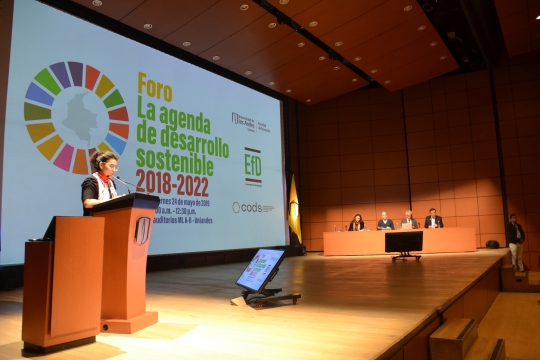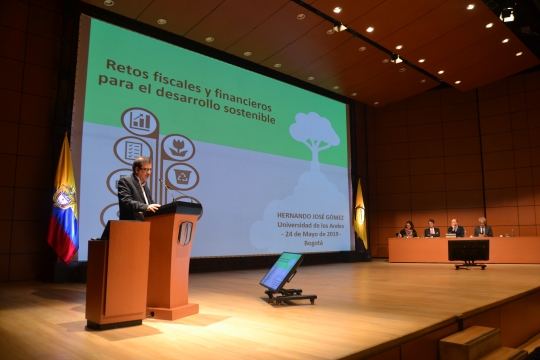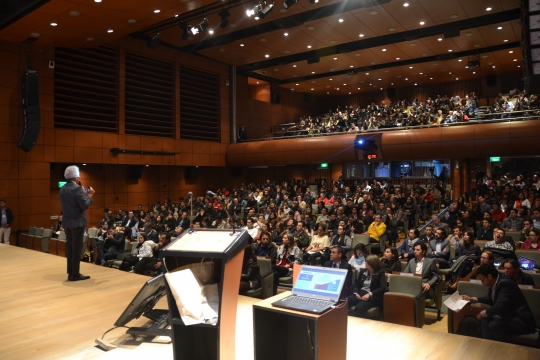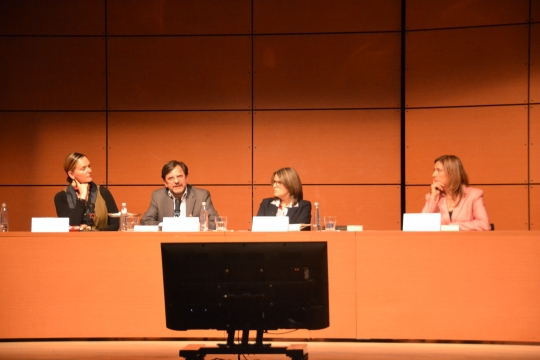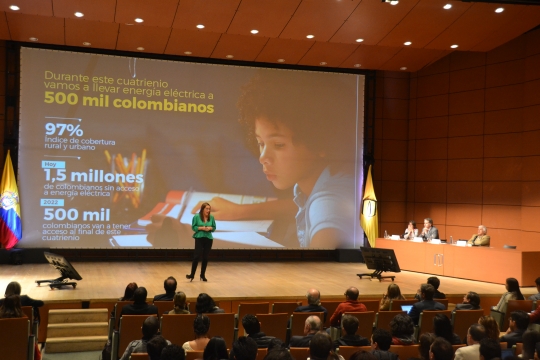On Friday May 24th, 2019, EfD Colombia hosted by the Economics Department at Universidad de los Andes, together with the Center for Sustainable Development Goals (CODS), organized a policy day at the university’s auditorium. The general topic of this policy day was “The sustainable development agenda 2018 – 2022”. The event was open to the general public and Universidad de los Andes received approximately 700 people.
The event had three main sections: sustainable development in the National Development Plan, non-conventional energy sources and the mission of energy transformation, and as final section, bioeconomics. The main goal of the event was to discuss the role of non-conventional renewable energy sources and bioeconomics in the national development agenda of the current Colombian government from 2018 to 2022.
At the beginning of the event, EfD Colombia Director Jorge Bonilla welcomed the public and the expositors to the event. He emphasized that this event was an opportunity to discuss these challenging topics for Colombia. After his welcoming words, the Colombian Minister of Environment and Development, Ricardo Lozano, made the opening of the event. The Minister explained how the vision of the sustainable development goals was included in the development agenda of the Colombian government and the challenges that the country encounters with deforestation, agricultural productivity, land use and water use.
In the first section “sustainable development in the National Development Plan”, the expositors were Rafael Puyana, sub-director of the National Planning Department, Alejandro Gaviria, director of CODS, Hernando José Gómez, former director of the National Planning Department and independent consultant. The debate was organized by Maria Alejandra Velez, senior researcher of EfD Colombia. Rafael Puyana explained how the sustainability was connected with legality, entrepreneurship, geographical regions, population and government in the National Development Plan for 2018 – 2022. Alejandro Gaviria emphasized that the government needs to have ambitious goals in the sustainable development area and he also remarked the contradiction that can be found between sustainable development goals. Hernando José Gómez commented on the financial and fiscal challenges of sustainable development in Colombia.
In the second section “non-conventional energy sources and the mission of energy transformation”, the expositors were Maria Fernanda Suárez, Colombian Minister of Energy, German Corredor, President of the Colombian renewable energy association, and Luis Felipe Velez, executive at Celsia, a firm specialized in energy provision. Angela Cadena, Researcher at the Engineering Department at Universidad de los Andes organized the debate. During her exposition, the Minister of Energy, Maria Fernanda Suarez, argued that Colombia had one of the cleanest energy matrix in the world. However, that made the energy provision vulnerable to climate change. For this reason, the government was leading the transition to non-conventional renewable energy sources, in order to increase the resilience to climate change. German Corredor commented that energy sector in Colombia needed to have more firms that contribute to an efficient energy market and that the goals settled by the government were below what the country needed. From the private sector point of view, Luis Felipe Velez argued that the balance of the energy matrix in Colombia will create business opportunities for firms investing in non-renewable energy.
In the third and last section, “bioeconomics”, the expositors were Claudia Betancur, Director of the company Biointropic, which is a think tank specialized in bioeconomics in Colombia; Guillermo Rudas, independent consultant, and Silvia Calderón director of the environment and sustainable development at the National Planning Department. Carolina Urrutia, director of “Parques como vamos” organized the debate with the public. Silvia Calderon remarked that the tension between economic development and environment could be solved through bioeconomics, because bioeconomics allow to bring together natural resources, sustainable production practices, innovation and private initiatives. Claudia Betancur commented that the Colombia needs to deal with big challenges. According to a research made by Biointropic, out of 98.000 identified companies only 300 are bio innovative. Guillermo Rudas argued that Colombia needs to improve its institutional benchmark and financial market in order to take advantage of the opportunities related to bioeconomics.
You can see the first half of the policy day here and the second half of the event (all in Spanish) here.
